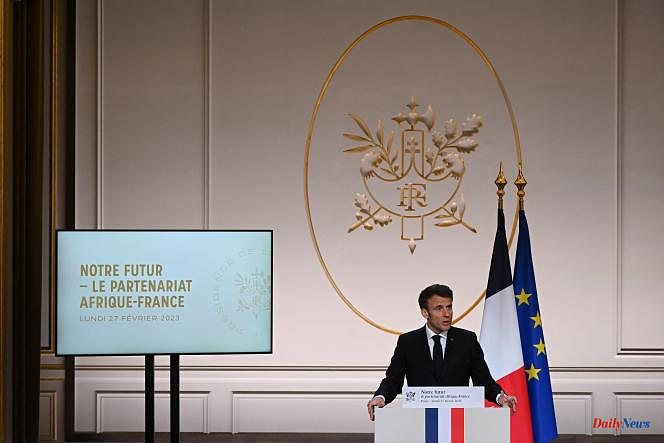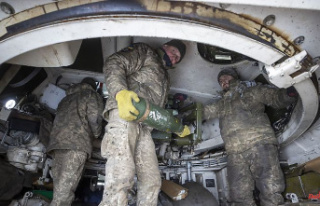Researcher at the Institute for Security Studies in Dakar, Fahiraman Rodrigue Koné deciphers the speech on Africa delivered by Emmanuel Macron at the Elysee Palace, Monday, February 27. For the Ivorian specialist in the Sahel, the political and security orientations announced by the president on the continent remain unclear, a symptom of the divisions that persist within the French executive on the question.
What part of this speech stood out to you the most?
Fahiraman Rodrigue Koné We can once again perceive a desire to profoundly change relations with Africa. But France has been saying for years that it wants to be more part of a logic of partnership, of cooperation with African countries, to insist on support and training, to Africanize solutions, particularly in terms of security. However, it is struggling to convince, because this transformation, which has been announced many times, has not been very visible on the ground.
Except in Niger, with the rearticulation of "Barkhane" (French anti-terrorist operation in the Sahel, launched in 2014) which has taken place in recent months. Leadership in the fight against terrorism no longer belongs to Paris. The French units are integrated into the Nigerien security system and are placed under the command of the Nigerien forces.
The president affirmed that the end of a cycle of French history in Africa was closing. A cycle notably marked by the pre-eminence of military issues. Do you think the announced breakup will take place?
These elements of language are communicated to try to make believe in a deep rupture but, for the moment, we do not see how it will materialize. In reality, France's African policy remains dominated by the security aspect. Paris has not announced the removal of its bases. Its military presence will therefore be maintained on the continent, even if, as has long been announced, it will be redefined.
A "visible reduction" in French military personnel in Africa has even been announced...
This statement remains unclear. No precise figures or timetable were given. Communicating on a reduction in staff, but without proposing a verifiable indicator, reveals the hesitations, ambiguities and internal tensions within the French state apparatus on the strategy to be implemented in Africa. French policy there is tossed between a conservative fringe that would like to keep a military presence on the spot and a progressive fringe that would like to remove the French bases to wipe out this vision of Africa considered anachronistic.
This ambivalence prevents Paris from reforming its policy in depth and from communicating clearly on its strategy. A work of unification should be carried out, to better define the orientations.
In West Africa, the feeling of anger against the French military presence continues to rise. Why choose to remain under these conditions?
We must not be fooled and Emmanuel Macron has also underlined it: France has interests to preserve. They are mainly geostrategic. Africa is a stone's throw from Europe. Seeing insecurity growing on its doorstep constitutes a threat. Just like the growing presence of the Russian adversary on the continent. For France, keeping a foothold there in terms of security is a way of keeping Russia at a distance, in an international context marked by strong tensions with Moscow.
Doesn't France also seek to preserve economic interests?
Obviously. We know, for example, that the economic weight of the uranium mined by France in Niger is colossal. More broadly, Paris seeks to protect economic poles that it had always taken for granted but which are now the subject of increased competition from major powers such as China or India. It's about staying competitive.
The French president insisted on the need to change software also on the economic level, moving from a "logic of aid" to a "logic of partnership solidarity investment". That's to say ?
Paris understood that it had to change its tune and now build more egalitarian economic partnerships with African countries. Until now, cooperation is mostly based on dependency. France gives but also imposes its standards.
Today, African states need to assert themselves economically, to industrialize, with partners who will give them the ability to choose their own model. This development, so far very conditioned by the West and which has generally not worked, is the central element which structures the rise of this anti-Western feeling in Africa, even if the security argument is put forward more. .
For Emmanuel Macron, France has assumed "exorbitant responsibility" for Mali's failure to fight against jihadist groups. He also preferred to take up the victories of "Barkhane", despite the setbacks. Isn't this a way for Paris to conceal its own responsibility for the security failure in the Sahel?
France is right to point out that the presence of "Barkhane" helped to restrict the movements of jihadist groups in the Sahel. But the objective set, namely to contain their expansion, has not been achieved. The Malian political and military elites certainly have a large share of the responsibility, but we must not forget that it was France that wanted to be and remain in charge of this fight against terrorism, relegating the Malian partners to the background. At the time of the balance sheet, it is normal for it to be accountable.
During this speech, the President reaffirmed that France supports African democracies and not military regimes. What do you think ?
France wants to keep its role as guardian of democracy, but should be more careful in its discourse because, in reality, its attitude has recently been marked by double standards. We saw it in Chad in April 2021: Paris adopted a conciliatory position, to say the least, vis-à-vis the new soldiers in power, unlike in Mali or Guinea, where coups d'etat were condemned. And when, in the past, France has supported so-called democratic regimes, it has also supported corrupt actors.
This French political paradox around democracy in Africa is one of the main levers of the discrediting of France on the continent. If Paris wants to continue to promote this model of political governance, which it seems to consider absolute, it has to walk the talk. Concrete and not speeches, this is what Africans expect.












